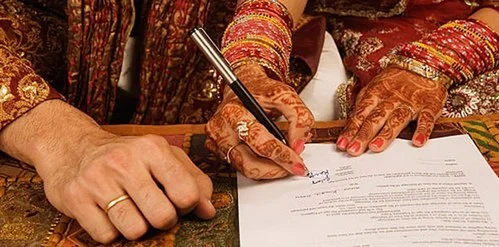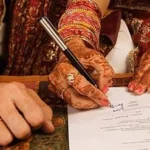
Court Marriage Process in India – Step-by-Step Legal Guide (2025)
Planning a court marriage in India? Learn the step-by-step legal procedure, required documents, Special Marriage Act guidelines, and expert advice to register your marriage without stress.

Introduction: Why Court Marriage Is Gaining Popularity in India
Court marriages in India are becoming increasingly popular among modern couples who seek a legally recognized union without religious rituals. Whether you’re in a love marriage, inter-caste relationship, or interfaith partnership, the court marriage process in India offers a clear, secular, and protected path to formalizing your commitment under the law.
Governed by the Special Marriage Act, 1954, court marriage allows two consenting adults—regardless of religion or caste—to marry legally without social or religious pressure. This article will walk you through the entire procedure for register marriage in India, highlighting documentation, legal steps, timelines, and more.
Who Can Opt for a Court Marriage in India?
Anyone who meets the following eligibility criteria can apply for court marriage in India:
- Both parties must be at least 21 years old (male) and 18 years old (female)
- Neither party should be already married (unless legally divorced or widowed)
- Parties must be mentally sound and capable of giving valid consent
- They must not fall within degrees of prohibited relationship (unless custom permits)
Unlike religious ceremonies, the legal process of court marriage in India is uniform and applies equally to all Indian citizens and NRIs.
Understanding the Special Marriage Act, 1954
The Special Marriage Act is the backbone of civil marriages in India. It allows individuals to marry regardless of caste, religion, or faith without converting. Here’s what you need to know about the special marriage act procedure:
- Applicable to: All Indian citizens, including NRIs
- Notice Period: 30 days public notice required before solemnization
- Jurisdiction: Application must be filed with the Marriage Registrar in the district where at least one party resides
- Objections: Any person can object within the notice period
This act ensures full transparency and gives legal rights to the married couple, especially useful in case of interfaith or intercaste unions.
Why Choose a Court Marriage Over Religious Ceremony?
Many couples today are choosing court marriages for their simplicity, legality, and neutrality. Here’s why:
- Secular & Non-religious: No religious rituals or conversions needed
- Legally Recognized: Valid across India and for visa/passport applications
- Time-efficient: Usually completed within 30–45 days
- Socially Protective: Especially for inter-caste, LGBTQ+, or interfaith couples
The procedure for register marriage in India is designed to be transparent and equitable—ensuring both parties have equal legal standing and protection.
Step-by-Step Court Marriage Process in India (2025)
The court marriage process in India follows a clearly defined path. Below is a simplified breakdown under the Special Marriage Act, 1954:
- Visit the Marriage Registrar’s Office: One party must reside in the jurisdiction of the office for at least 30 days.
- Submit Notice of Intended Marriage: Fill and submit Form 1 along with ID/address proof and photos of both parties.
- Public Notice Issued: A 30-day notice is displayed on the registrar’s notice board.
- Objection Period: Anyone can object to the marriage within these 30 days; objections must have valid legal grounds.
- Verification & Hearing (if objected): Registrar reviews objections, if any. If cleared, the process continues.
- Solemnization of Marriage: On the scheduled date (after 30 days), the couple signs the register in front of 3 witnesses.
- Marriage Certificate Issued: A legal proof of your marriage is given immediately after solemnization.
Ensure both parties and all witnesses carry original documents on the day of solemnization.
Documents Required for Court Marriage in India
To ensure smooth processing, you’ll need to gather and submit the following documents with self-attested copies:
- Application Form (Form 1) signed by both parties
- Proof of Date of Birth (SSC mark sheet, Passport, etc.)
- Address Proof (Aadhaar, Voter ID, Passport)
- Passport-sized photos (3 each)
- Affidavit of Marital Status (single/divorced/widow)
- Death Certificate or Divorce Decree (if applicable)
- 3 Witnesses with ID and Address Proof
For court marriage in Mumbai procedure, documents may also include police verification or residence certificate depending on the local municipal rules.
Who Can Be a Witness in Court Marriage?
At least 3 witnesses are required to be present at the time of solemnization. Eligibility includes:
- Above 18 years of age
- Mentally sound
- Have valid ID (Aadhaar, PAN, Passport, Voter ID)
- Not directly involved in the marriage (i.e., not the couple)
Witnesses are required to sign the marriage register along with the couple. They may be contacted for verification later, so ensure their details are accurate.
What If an Objection Is Raised?
During the 30-day notice period, if an objection is raised, the Registrar will:
- Conduct a hearing within 30 days of receiving the objection
- Verify the validity of the claim with supporting documents
- Accept or reject the objection with a written explanation
If the objection is upheld, the couple may need to file an appeal or resolve the issue through legal means before proceeding with the marriage.
State-Specific Variations: Mumbai, Delhi, Gujarat
While the legal process of court marriage in India is centrally governed, some local rules may apply. For example:
Court Marriage in Mumbai
Registrar’s offices are located across zones. Some may ask for a police NOC if one party is from another state. Weekend marriages are not usually allowed.
Court Marriage in Delhi
Under the special marriage act procedure in Delhi, the 30-day public notice is published digitally and physically. Objections are monitored closely.
Court Marriage in Gujarat
Ahmedabad offices near Subhash Bridge and RTO are commonly used. Legal consultants can assist with Gujarati translations and affidavit formats.
Timeframe and Cost for Court Marriage in India
The entire process—from filing notice to receiving your marriage certificate—typically takes 30–45 days. Here’s a breakdown:
- Notice Period: 30 days after submitting Form 1
- Certificate Issuance: On the day of solemnization (Day 31 or later)
- Total Duration: 35–45 days including holidays or objection hearings
Estimated Court Marriage Cost:
- Government Fees: ₹100–₹150 (varies by state)
- Affidavit & Stamp Paper: ₹200–₹500
- Documentation & Notary: ₹300–₹800
- Legal Consultation (optional): ₹2,000–₹8,000
For the procedure of court marriage in Maharashtra, the state provides a user-friendly online portal for document tracking, though in-person visits are still mandatory for verification and solemnization.
Benefits of Court Marriage in India
Many couples opt for court marriage because it provides legal clarity and peace of mind. Key benefits include:
- Legally recognized nationwide
- No religious pressure or conversion required
- Accepted for visa, passport, banking, and insurance purposes
- Helps protect against forced marriage or coercion
The legal procedure for court marriage in India is especially useful for couples facing family resistance or those who want to secure their rights under the law.
Special Note: Hindu-Muslim Court Marriage in India
India’s secular laws permit interfaith marriages under the Special Marriage Act. If you are a Hindu and Muslim couple, here’s what you should know:
- No religious conversion required: Both parties retain their faith
- 30-day notice is mandatory: Published at the registrar’s office
- Affidavits and additional verification: Some states may request extra documentation to prevent fraudulent marriages
The hindu muslim court marriage procedure in India often faces social resistance. Seeking support from a qualified legal consultant ensures the process is smooth, protected, and in compliance with the law.
Can NRIs Apply for Court Marriage in India?
Yes. Non-Resident Indians (NRIs) can register a marriage under the Special Marriage Act. Key conditions include:
- One party must reside in India for at least 30 days
- All foreign documents must be apostilled or notarized at the Indian embassy
- Passport and visa/residence proof must be submitted
NRI couples often opt for court marriage in India due to visa timelines and embassy requirements. Once registered, the marriage certificate can be used internationally.
What Happens After Court Marriage?
Once your court marriage is complete and certified, you gain the following legal protections:
- Right to spousal maintenance under CrPC 125
- Right to inheritance and property claims
- Right to adopt or take child custody as a legal couple
- Right to file divorce or annulment under Special Marriage Act
Your court marriage certificate is your primary legal proof of marital status in all Indian and international matters.
Common Mistakes to Avoid in Court Marriage Procedure
Even though the court marriage procedure in India is straightforward, couples often face delays or rejections due to small mistakes. Here’s what to avoid:
- Submitting incomplete documents: All forms, ID proofs, and affidavits must be duly filled and signed
- Providing incorrect addresses: Your jurisdiction depends on residential proof—double-check it
- Missing the objection period deadline: If an objection arises, failure to attend the hearing can cause cancellation
- Wrong witness details: Ensure your witnesses carry correct IDs and are present on the date of marriage
- Skipping verification visits: In some states, a verification officer may visit your residence—cooperate fully
By avoiding these errors, you can ensure a smooth and stress-free court marriage registration experience.
Conclusion: Secure Your Marriage Legally with Confidence
The court marriage process in India offers a secure, transparent, and efficient way for couples to formalize their relationship without religious limitations. It ensures that your marriage is recognized not only across India but also internationally, empowering you with full legal rights as a couple.
- 30-day notice ensures transparency
- Legal certificate provides protection and proof
- Supports interfaith, intercaste, and NRI couples
From documentation to final solemnization, understanding each step makes the process easier. Always consult a legal expert for guidance, especially in interfaith or NRI cases.
Whether you’re in love or planning a peaceful life together—court marriage in India is your legitimate and respectful path forward.
Need Legal Assistance for Court Marriage?
Advocate Ace provides expert court marriage consultation and legal help across all major Indian cities. From notice filing to final certificate, we handle everything to ensure a smooth and quick process.
Book a Free Legal Consultation

